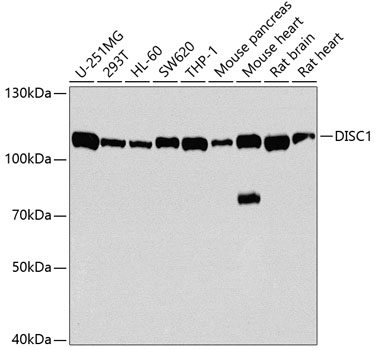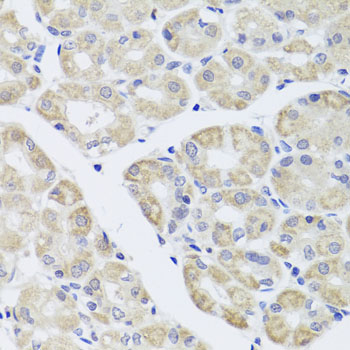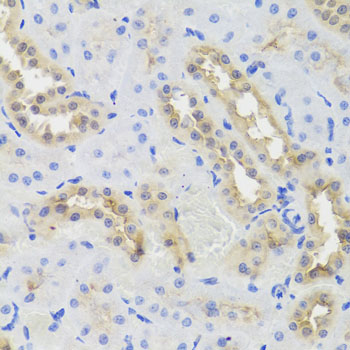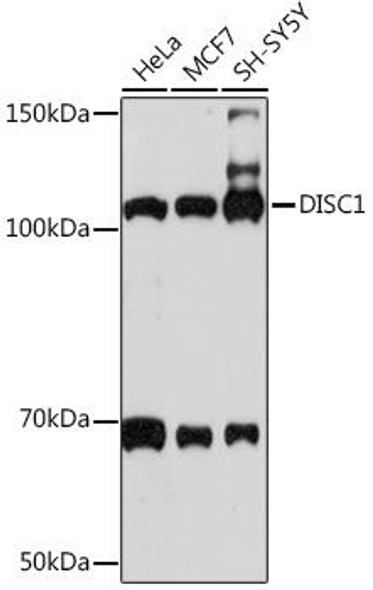Neuroscience
Anti-DISC1 Antibody (CAB2898)
- SKU:
- CAB2898
- Product Type:
- Antibody
- Reactivity:
- Human
- Reactivity:
- Mouse
- Reactivity:
- Rat
- Host Species:
- Rabbit
- Isotype:
- IgG
- Research Area:
- Neuroscience
Description
| Antibody Name: | Anti-DISC1 Antibody |
| Antibody SKU: | CAB2898 |
| Antibody Size: | 20uL, 50uL, 100uL |
| Application: | WB IHC |
| Reactivity: | Human, Mouse, Rat |
| Host Species: | Rabbit |
| Immunogen: | Recombinant fusion protein containing a sequence corresponding to amino acids 1-200 of human DISC1 (NP_001158009.1). |
| Application: | WB IHC |
| Recommended Dilution: | WB 1:500 - 1:2000 IHC 1:50 - 1:200 |
| Reactivity: | Human, Mouse, Rat |
| Positive Samples: | U-251MG, 293T, SW620, THP-1, mouse pancreas, mouse heart, rat brain, HL-60, Rat heart |
| Immunogen: | Recombinant fusion protein containing a sequence corresponding to amino acids 1-200 of human DISC1 (NP_001158009.1). |
| Purification Method: | Affinity purification |
| Storage Buffer: | Store at -20'C. Avoid freeze / thaw cycles. Buffer: PBS with 0.02% sodium azide, 50% glycerol, pH7.3. |
| Isotype: | IgG |
| Sequence: | MPGG GPQG APAA AGGG GVSH RAGS RDCL PPAA CFRR RRLA RRPG YMRS STGP GIGF LSPA VGTL FRFP GGVS GEES HHSE SRAR QCGL DSRG LLVR SPVS KSAA APTV TSVR GTSA HFGI QLRG GTRL PDRL SWPC GPGS AGWQ QEFA AMDS SETL DASW EAAC SDGA RRVR AAGS LPSA ELSS NSCS PGCG PEVP PTPP |
| Gene ID: | 27185 |
| Uniprot: | Q9NRI5 |
| Cellular Location: | Cell junction, Cytoplasm, centrosome, cytoskeleton, microtubule organizing center, postsynaptic cell membrane, postsynaptic density, synapse |
| Calculated MW: | 22kDa/37-38kDa/6-93kDa |
| Observed MW: | 105kDa |
| Synonyms: | DISC1, C1orf136, SCZD9 |
| Background: | This gene encodes a protein with multiple coiled coil motifs which is located in the nucleus, cytoplasm and mitochondria. The protein is involved in neurite outgrowth and cortical development through its interaction with other proteins. This gene is disrupted in a t(1;11)(q42.1;q14.3) translocation which segregates with schizophrenia and related psychiatric disorders in a large Scottish family. Alternate transcriptional splice variants, encoding different isoforms, have been characterized. |
| UniProt Protein Function: | DISC1: Involved in the regulation of multiple aspects of embryonic and adult neurogenesis. Required for neural progenitor proliferation in the ventrical/subventrical zone during embryonic brain development and in the adult dentate gyrus of the hippocampus. Participates in the Wnt-mediated neural progenitor proliferation as a positive regulator by modulating GSK3B activity and CTNNB1 abundance. Plays a role as a modulator of the AKT-mTOR signaling pathway controlling the tempo of the process of newborn neurons integration during adult neurogenesis, including neuron positioning, dendritic development and synapse formation. Inhibits the activation of AKT-mTOR signaling upon interaction with CCDC88A. Regulates the migration of early-born granule cell precursors toward the dentate gyrus during the hippocampal development. Plays a role, together with PCNT, in the microtubule network formation. A chromosomal aberration involving DISC1 segregates with schizophrenia and related psychiatric disorders in a large Scottish family. Translocation t(1;11)(q42.1;q14.3). The truncated DISC1 protein produced by this translocation is unable to interact with ATF4, ATF5 and NDEL1. Genetic variation in DISC1 is associated with susceptibility to schizophrenia type 9 (SCZD9). A complex, multifactorial psychotic disorder or group of disorders characterized by disturbances in the form and content of thought (e.g. delusions, hallucinations), in mood (e.g. inappropriate affect), in sense of self and relationship to the external world (e.g. loss of ego boundaries, withdrawal), and in behavior (e.g bizarre or apparently purposeless behavior). Although it affects emotions, it is distinguished from mood disorders in which such disturbances are primary. Similarly, there may be mild impairment of cognitive function, and it is distinguished from the dementias in which disturbed cognitive function is considered primary. Some patients manifest schizophrenic as well as bipolar disorder symptoms and are often given the diagnosis of schizoaffective disorder. 8 isoforms of the human protein are produced by alternative splicing. |
| UniProt Protein Details: | Protein type:Cell development/differentiation; Motility/polarity/chemotaxis Chromosomal Location of Human Ortholog: 1q42.1 Cellular Component: microtubule; centrosome; postsynaptic membrane; mitochondrion; postsynaptic density; cell junction Molecular Function:protein binding Biological Process: positive regulation of neuroblast proliferation; mitochondrial calcium ion homeostasis; TOR signaling pathway; cell proliferation in forebrain; neuron migration; cerebral cortex radially oriented cell migration; Wnt receptor signaling pathway through beta-catenin; microtubule cytoskeleton organization and biogenesis; positive regulation of Wnt receptor signaling pathway Disease: Schizophrenia; Schizophrenia 9 |
| UniProt Code: | Q9NRI5 |
| NCBI GenInfo Identifier: | 160332362 |
| NCBI Gene ID: | |
| NCBI Accession: | Q9NRI5.3 |
| Molecular Weight: | |
| NCBI Full Name: | Disrupted in schizophrenia 1 protein |
| UniProt Protein Name: | Disrupted in schizophrenia 1 protein |
| Protein Family: | Disrupted in schizophrenia |
| UniProt Gene Name: | DISC1 |
| UniProt Entry Name: | DISC1_HUMAN |
View AllClose









